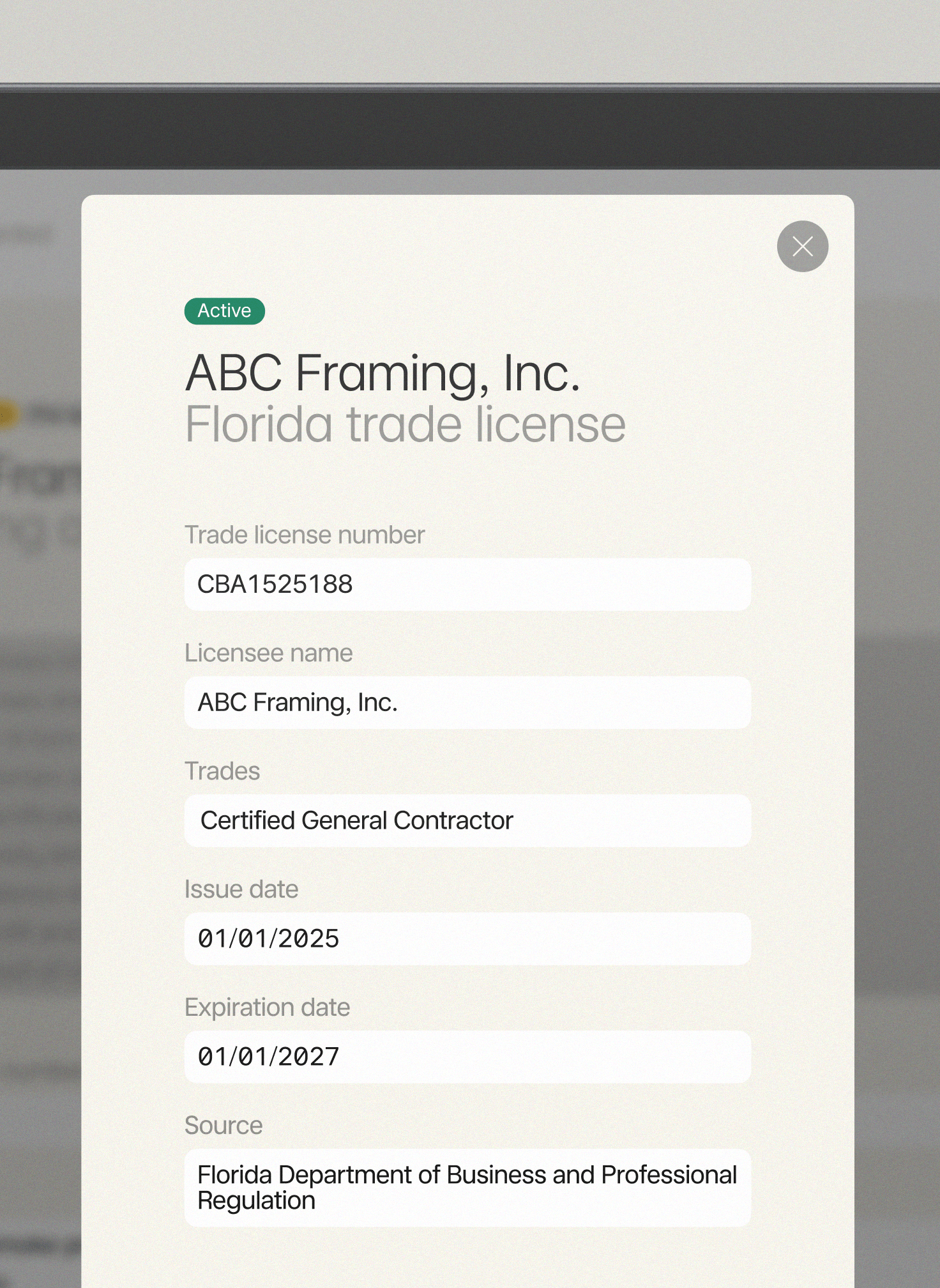Florida contractor trade licensing guide
Published on October 8, 2025
In Florida, as in most states, if you are a construction contractor wishing to do business in the state you must acquire an appropriate license for your trade or specialty. Licensing is intended to ensure that a contractor has the knowledge, skills, and experience needed to safely and competently perform work while adhering to all applicable regulations and building codes.
There are two types of trade contractor licenses in Florida: certified and registered. A certified license allows a contractor to perform the work they are licensed for in any part of the state without restriction. A registered license is more limited and allows a contractor to perform work for which they are licensed only in specific local jurisdictions, like a city or county, where they’ve obtained a certificate of competency.
For most construction trade licenses, the certification process is governed and overseen by the Construction Industry Licensing Board (CILB), which is part of the Department of Business and Professional Regulation (DBPR). These include, but are not limited to, air conditioning, building, general, mechanical, plumbing, roofing, and sheet metal. There are also specialty licenses that include various trades, such as building demolition, drywall, and glass and glazing.
Trade licenses for electrical, alarm systems, and specialty electrical are governed and overseen by the Electrical Contractors Licensing Board (ECLB). Special electrical covers a variety of electrical work, such as limited energy systems, sign installation, residential electrical work, lighting maintenance, and utility line work.
Requirements for licensing
To become a certified contractor in Florida, you must meet the following requirements.
- ●
Be 18 years of age or older
- ●
Have at least four years of relevant work experience or a combination of college education and relevant work experience
- ●
Demonstrate financial stability
- ●
Submit fingerprints and pass a criminal background check
- ●
Pass a state administered licensing exam
- ●
Provide proof of liability, property damage, and workers’ compensation insurance, if qualifying as a business
- ●
Pay the application fee
To demonstrate financial responsibility, an applicant must have no unsatisfied liens and judgments against themselves or the company they want to qualify, and must maintain a FICO credit score of 660 or higher. Applicants with a credit score below 660 can still meet the financial responsibility requirements by completing a 14-hour Financial Responsibility Course.
For registered trade licenses, the requirements are identical except for the ones pertaining to passing a state administered exam and having four years of work experience. Instead they must obtain a certificate of competency from the local licensing authority that matches the licensure category for which they are applying.
License reciprocity
Florida has trade license reciprocity agreements with Louisiana, North Carolina, and Georgia. The license reciprocity is only for a limited number of categories which include: General, Building, and Residential.
Reciprocity applications are also accepted by anyone who has passed the 2009 or later National Association of State Contractors Licensing Agencies (NASCLA) General Contractors Exam.
License endorsements
The DBPR notes that the requirements for endorsement applications for trade licenses in Florida are “very stringent and rarely approved” by the CILB.
Instead of taking the state’s licensing exam, applicants need to have passed an exam that is substantially equivalent to the Florida licensing exam and meet the work experience and all other requirements for licensure or hold a valid trade license issued by another U.S. state or territory if the licensing requirements are substantially equivalent to current Florida criteria.
License renewals
Contractor licenses in Florida are valid for two years before needing to be renewed. Licensees for construction industry renewals must complete 14 hours of Continuing Education (CE) and pay the license renewal fee.
CE courses and providers for construction licenses must be approved by the CILB with a minimum of one hour of CE credit for specialized or advanced modules, workplace safety, business practices, workers' compensation, and Florida laws and rules.
For electrical contractors, the ECLB requires 11 hours of CE for electrical contractors and seven hours for alarm system contractors and specialty electrical contractors and similar minimum requirements to those of the CILB.
Automated trade license collection and monitoring
Area automates qualification and monitoring of Florida trade licenses between general contractors and their subcontractors.
Area automatically collects and verifies license information from all trade partners directly with the issuing authority. Then it monitors licenses daily and sends alerts when a license status changes or approaches expiration.
Want to learn more? Book a demo today.
